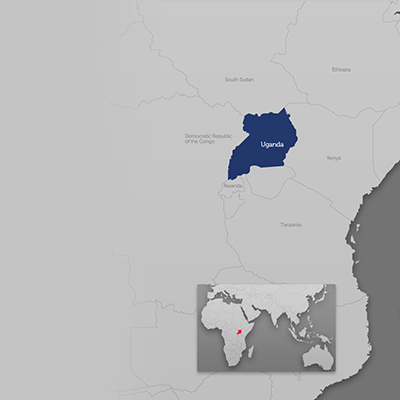Real Medicine Foundation - Initiative "Healthcare Implementing Partner for UNHCR at Kiryandongo Refugee Settlement"
Status: Active
Summary
The Kiryandongo Refugee Settlement in Bweyale, Uganda, is a UNHCR managed refugee settlement that provides shelter, land, and support for more than 100,000 people. They are comprised of refugees from Kenya, DR Congo, Rwanda, Burundi, and South Sudan. RMF has partnered with UNHCR in supporting Kiryandongo Refugee Settlement, the surrounding community of Bweyale, and the greater Kiryandongo District (at least 266,197 additional people) with health care, education, and vocational training since 2008.
This initiative focuses specifically on RMF’s role as a health care implementation partner.
Action Plan
On January 10th, Real Medicine Foundation (RMF) signed a tripartite agreement with UNHCR and the Government of Uganda to implement a health program aimed at addressing two goals:
- Emergency operations
- Care and maintenance of refugees and asylum seekers in Kiryandongo Refugee Settlement through the delivery of quality health care services
There are a total of three health facilities:
- Panyadoli Health Centre III
- Panyadoli Hills Health Centre II
- Reception Centre Clinic
These centers are directly being supported by UNHCR. Also, there have been significant numbers of PoCs (population of concern) accessing services at Nyakadot Health Centre II as some of the refugees have sought to settle at Bweyale Trading Centre. Nyakadot Health Centre II is located in the host community.
Our Role
RMF has hired a manager who is responsible for the overall implementation and coordination of planned interventions, whereas OPM and UNHCR do oversight functions. Activities are planned, coordinated, and reviewed on a weekly, monthly and quarterly basis through coordination meetings chaired by OPM at the settlement level.
Challenges
Risk Management
During program implementation, RMF has observed three key factors in regards to program risk management, including the following:
District Leadership
Working closely with the local governments and other community leaders is important if we are to achieve our objectives effectively and efficiently. Therefore, RMF held a meeting with the District Health Officer to make them fully aware of the project objectives, thus justifying our relevance in terms of health care delivery. This yielded high level cooperation that contributed to the realization of program goals and objectives.
Community
Persons of concern and the community at large must be willing to accept and cooperate with RMF if we are to deliver quality services to the community. During the project inception, we held an introductory meeting with refugee leaders (as they represent the wider community). The objective was to highlight intended goals and objectives in order to enlist their cooperation throughout program implementation.
Cooperation with Partners
Full cooperation and coordination with other implementing and operating partners delivering services is important for us if we are to realize our goals in the proposed program. During implementation, much was shared in terms of work plans, referrals, and any other relevant information that enhanced our coordinated approach to service delivery.
Initial Challenges
Included:
- Inadequate staffing
- Shortage of drugs
- Poor referral system characterized by both lack of an ambulance and the community structure
- Poor infrastructure
- Low demand for health services by the population
- Absence of a coherent disease surveillance strategy
Due to programs implemented by RMF, all the indicators have been improved.
However, the unstable political situation in South Sudan poses a significant risk that many more refugees will cross into Uganda in search of asylum. This may lead to a further increased population of refugees that has not been budgeted for, thus causing a strain on the health system in the settlement.
In order to sustain results, RMF continues to conduct needs assessments to ascertain the arising need and inform its planning.
Ongoing Presence
Since the beginning of the project, the health care centers have grown to benefit more than 100,000 refugees according to statistics from the UNHCR and Office of the Prime Minister. It is also recorded that 36,000 people from the host community and up to 266,197 nationals living within the Kiryandongo District continue to benefit from the Health Project as a result of quality health services provided.

Support this Initiative
Donate
Online
Use your credit card or PayPal to support this initiative.


